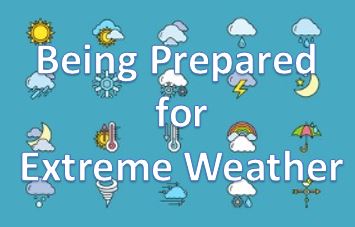Elderly people are especially vulnerable to extreme temperatures. As we head into summer, it is vital for caregivers to know heat stroke symptoms and ways to help loved ones stay cool and safe. Extreme winter temperatures might not be on our minds now, but winter weather also affects many elders and we provide some all-year-round preparation tips.
Heat Stroke Symptoms
Older people are vulnerable to heat-related illness since it is harder for an older adult’s body to regulate temperature. Additionally, chronic medical conditions and medications can make some older adults even more susceptible.
Heat stroke is the most severe form of heat-related illness and can cause death or permanent disability if not treated immediately. Caregivers should know heat stroke symptoms to monitor for such symptoms in order to seek emergency medical attention. Heat stroke symptoms include:
- Red, hot, and dry skin (changes in sweating, i.e. no sweating)
- Rapid heartbeat
- Throbbing headache
- Dizziness
- Nausea
- Altered mental state (confusion, disorientation and even seizures and unconsciouness)
- Extremely high body temperature (above 103°F)
The more mild form of heat-related illness is heat exhaustion, which often develops after being in high temperatures for several days and/or not getting enough fluids and proper balance of fluids and electrolytes. Spotting these symptoms and intervening can prevent a dangerous situation from worsening:
- Heavy sweating, paleness, muscle cramps, weakness, exhaustion, dizziness, headache, nausea/vomiting, fainting
- Skin may be cool and moist and the person’s pulse rate is often fast and weak, while their breathing is shallow and rapid
Dehydration is also a common problem in the elderly at all times of year, but especially when temperatures are high. Signs of dehydration in elders may include: confusion, dizziness, headaches, dry mouth, sunken eyes and lack of skin elasticity, inability to produce sweat or tears, low urine output (and dark urine color), constipation, and low blood pressure. Adequate bodily fluid is essential for many of the body’s functions and dehydration is one of the top 10 reasons for Medicare hospital admissions.
Tips to Prevent Heat-Related Illness
Avoid a high level of activity (especially outdoors) in the heat of the day. See our caregiver team’s ideas for great indoor activities and places you can go to enjoy an air-conditioned environment and have some fun. Take a nap or spending quite time resting in the afternoon.
Stay well hydrated. Keep water by your side at all times (caregivers can help by encouraging drinking, monitoring intake and refilling the water). Add fruit, try sparkling water, and various beverages for those who don’t like plain water (try to avoid too many caffeinated beverages which have a diuretic effect and excessive sugary drinks). Fruit and vegetables with a high water content can contribute to your fluid intake as well.
Make sure air conditioning units are maintained to avoid having problems during the heat. Schedule a “checkup” before the season and change filters regularly. Use fans to circulate the air or help if A/C is out. For those who don’t have air conditioning, visit air-conditioned venues during the day (the mall, movies, a coffee shop or library). Check on your loved one’s home throughout the summer, and especially during heat waves, to make sure the A/C is working, temperatures are at a reasonable level and they are not experiencing any problems. For those who do not have central air-conditioning, you might consider a portable/window unit or even a respite stay at a retirement community with A/C if a heat wave is predicted.
Be very careful about the sun; stay in the shade when outdoors, wear sunscreen, and get your skin checked by a dermatologist (read up on our summer sun prevention and warning signs).
Check in on your loved ones. Call or visit every few hours during extreme weather; help get them to air conditioning when needed; hire services to provide support (lawn and outdoor maintenance so Mom or Dad won’t be tempted to do those chores in the heat and/or caregivers to help with chores, monitoring and healthy diet/fluids).
Extreme Cold
The other extreme can be just as dangerous for elders. Older adults can lose body heat faster than when they were young. Hypothermia occurs when your body temperature gets very low. For an elder, a body temperature colder than 95 degrees Farenheit can cause health problems such as cardiac issues, kidney problems, liver damage, and more.
The CDC offers a great guide to preparing for cold weather. Help your loved one with the preparation steps and check in, no matter if it’s extreme heat, cold or other weather events.
Our team is here to help! Need advice on health and safety for your older loved one? Need an assessment or caregivers to help with tasks? Call us at 727-447-5845 or contact Aging Wisely online.


 Popular Downloads
Popular Downloads


 Get Our Newsletter!
Get Our Newsletter! Mission Statement
Mission Statement

